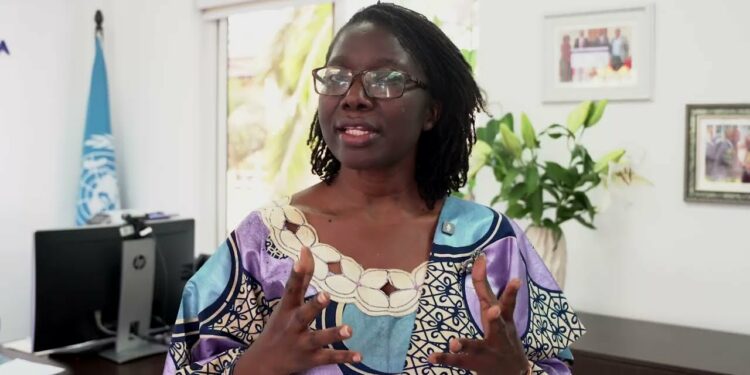Nigeria’s commitment to building an inclusive and future-ready migration system took centre stage yesterday as the Chief of Mission of the International Organisation for Migration (IOM), Ms. Sharon Dimanche, lauded the federal government’s leadership in advancing a revised national migration policy and its Integrated Implementation Plan (IIP).
Speaking at the validation workshop held at the Abuja Continental Hotel, Dimanche hailed the revised policy as a “milestone” that not only aligns with global migration frameworks but also captures Nigeria’s evolving migration realities—marked by growing internal displacement, the “Japa” wave, economic-driven mobility, and a dynamic diaspora remittance inflow of $19.5 billion in 2023.
Federal Commissioner of the National Commission for Refugees, Migrants and Internally Displaced Persons (NCFRMI), Tijjani Aliyu Ahmed, reaffirmed the country’s commitment to a “coordinated, effective, and human-centred” approach to migration management.
Speaking at the Validation Exercise for the Revised National Migration Policy (NMP) 2025 and its Integrated Implementation Plan (IIP), Ahmed declared that the update to the 2015 policy marks a decisive step in addressing the full spectrum of migration issues in today’s complex landscape.
“Migration continues to sit prominently at the heart of development discussions globally. Its dynamism demands a responsive and forward-looking policy framework,” he said. “This revised policy is the product of rigorous review, wide consultation, and strategic alignment with global standards such as the Global Compact for Migration.”
Dimanche said, “This policy is more than just a framework; it is a call to action. It calls for stronger collaboration across ministries, departments, and agencies, a whole-of-government and whole-of-society approach, and most importantly, a call to recenter the conversation around those most affected—migrants themselves.”
Nigeria is not just a country of origin for migrants—it is a key destination and transit hub in West Africa. Dimanche highlighted the urgent need for a comprehensive policy that reflects migration’s complexity in a country of over 216 million people.
The revised policy was described as a strategic tool for national development, aligning with global compacts like the Sustainable Development Goals (SDGs), the Global Compact for Migration (GCM), the Migration Policy Framework for Africa, and the ECOWAS Free Movement Protocol.
“With this policy, Nigeria is positioning itself not just as a regional leader in migration governance, but as a country that sees migration not as a crisis to be managed, but as an opportunity to be harnessed,” Dimanche concluded.
The validation workshop marks the final step before the revised National Migration Policy is submitted to the Federal Executive Council for adoption.
The minister of state humanitarian affairs and poverty reduction, Dr Yusuf Tanko Sununu, emphasised the significance of the policy revision, describing it as a “strategic and forward-looking” effort to align Nigeria’s migration governance with global standards. “The revised policy seeks to strengthen institutional coherence, mainstream international best practices, and reinforce national ownership of migration governance,” the minister said, noting that the original 2015 policy required an urgent update to reflect emerging migration trends and Nigeria’s obligations under frameworks like the Global Compact for Migration (GCM).
The Minister further acknowledged the inclusive and consultative process that led to the current draft, commending the 19-member Policy Review Committee, coordinated by the National Commission for Refugees, Migrants and Internally Displaced Persons (NCFRMI), for its diligent work.
“Extensive consultations were conducted across the six geopolitical zones, engaging both government and non-state actors. The result is a draft policy that reflects the aspirations and realities of Nigerians across all levels,” the minister said, assuring stakeholders of the ministry’s commitment to pushing for prompt adoption of the revised policy by the Federal Executive Council.
Ahmed said the revision process, initiated in 2022, was guided by national priorities and emerging global migration realities.
His remarks reinforced the earlier statement by the IOM chief of mission, Ms Sharon Dimanche, who had described the revised policy as a milestone in Nigeria’s journey toward inclusive and data-driven migration governance. Together, their positions underscore a unified push for the Federal Executive Council to adopt the revised framework without delay.
Chairman of the Nigerians in Diaspora Commission (NIDCOM), Abike Dabiri-Erewa, called for the protection of migrants while urging awareness of potential migrants. “We need to protect the migrants. Migration is not a crime. How do we encourage more awareness about the dangers of migration? Whether regular or irregular, they are not criminals. We just need to create awareness to guide their decisions about migration.
She said Nigeria is part of developing a concrete policy to address migration issues. We are looking for a concrete result that will take place after the policy is launched.



